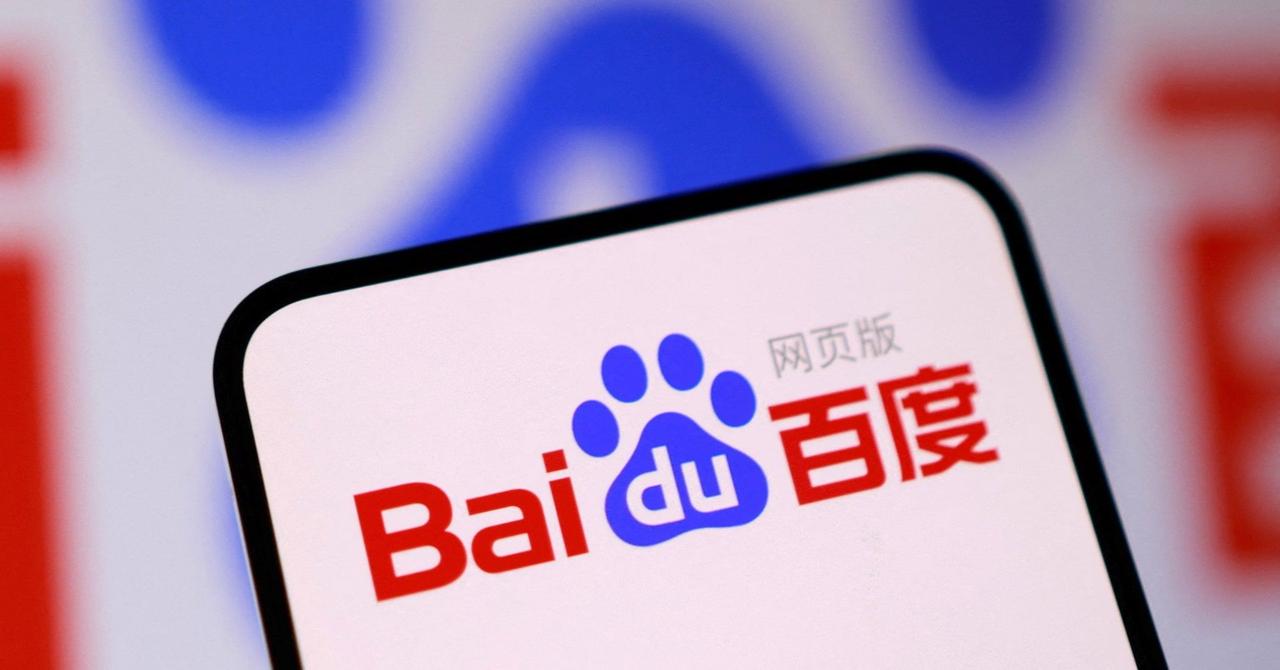Baidu Emphasizes AI Capabilities Amid Stagnant Ad Revenue
4 Sources
4 Sources
[1]
Baidu touts AI edge as ad revenue stalls
Baidu's comment came amid an AI price war in China, where companies have slashed prices of large language models used to power generative AI products. "Competition will be fierce over the next 2 to 3 years." CEO Robin Li said in an earnings call following the company's Q2 release.Baidu said its leading position in AI in China means it is well positioned to navigate an increasingly competitive market despite reporting a decline in quarterly revenue. The comment came amid an AI price war in China, where companies have slashed prices of large language models used to power generative AI products. "Competition will be fierce over the next 2 to 3 years." Baidu CEO Robin Li said in an earnings call following the company's Q2 release. Li added that the company's Ernie platform handles over 600 million requests to its AI system daily, which he claimed is the highest among Chinese companies. Baidu, China's dominant search engine, earns most of its revenue from ads. In recent years, it has increased investment in AI as part of its transformation into a "AI company". For the three months ending in June, revenue dropped 0.4% to 33.93 billion yuan ($4.67 billion), compared with analysts' average estimate of 33.55 billion, LSEG data showed. Baidu's online marketing business, which generates the majority of its revenue, fell 2% to 19.2 billion yuan. The decline reflects a slowing Chinese economy still recovering from a property market slump, prompting advertisers to tighten their budgets. Ernie, Baidu's large language model platform touted as a rival to OpenAI's GPT, has been embedded into various app services, aiming to improve user experience. The company has also launched a paid version of its Ernie-powered chatbot for public use, while selling API services powered by Ernie to developers through its cloud computing offerings. Li said generative AI contributed 9% to Baidu's cloud computing revenue of 5.1 billion yuan in Q2, up from 6.9% in Q1. As part of its AI push, Baidu has also ramped up investment in autonomous vehicles. Its Apollo Go robotaxis are now operating in multiple Chinese cities, with the largest fleet of 500 vehicles running in Wuhan. While this business has yet to significantly contribute to revenue, Baidu has said that Apollo Go operations in Wuhan are expected to reach break-even by the end of this year. Adjusted net income fell 8% to 7.4 billion yuan but beat the 6.45 billion yuan expected by analysts. U.S.-listed shares of Baidu were down 3.3% in early trading. ($1 = 7.14 Chinese yuan renminbi)
[2]
Baidu touts AI edge as ad revenue stalls
"Competition will be fierce over the next 2 to 3 years." Baidu CEO Robin Li said in an earnings call following the company's Q2 release. Li added that the company's Ernie platform handles over 600 million requests to its AI system daily, which he claimed is the highest among Chinese companies. Baidu, China's dominant search engine, earns most of its revenue from ads. In recent years, it has increased investment in AI as part of its transformation into a "AI company". For the three months ending in June, revenue dropped 0.4% to 33.93 billion yuan ($4.67 billion), compared with analysts' average estimate of 33.55 billion, LSEG data showed. Baidu's online marketing business, which generates the majority of its revenue, fell 2% to 19.2 billion yuan. The decline reflects a slowing Chinese economy still recovering from a property market slump, prompting advertisers to tighten their budgets. Ernie, Baidu's large language model platform touted as a rival to OpenAI's GPT, has been embedded into various app services, aiming to improve user experience. The company has also launched a paid version of its Ernie-powered chatbot for public use, while selling API services powered by Ernie to developers through its cloud computing offerings. Li said generative AI contributed 9% to Baidu's cloud computing revenue of 5.1 billion yuan in Q2, up from 6.9% in Q1. As part of its AI push, Baidu has also ramped up investment in autonomous vehicles. Its Apollo Go robotaxis are now operating in multiple Chinese cities, with the largest fleet of 500 vehicles running in Wuhan. While this business has yet to significantly contribute to revenue, Baidu has said that Apollo Go operations in Wuhan are expected to reach break-even by the end of this year. Adjusted net income fell 8% to 7.4 billion yuan but beat the 6.45 billion yuan expected by analysts. U.S.-listed shares of Baidu were down 3.3% in early trading. ($1 = 7.14 Chinese yuan renminbi) (Reporting by Yelin Mo in Beijing and Yuvraj Malik in Bengaluru; editing by Alan Barona and Elaine Hardcastle)
[3]
Baidu reports flat Q2 revenue as China's economic slowdown hits ad spending
U.S.-listed shares of Baidu were up more than 1% in premarket trading. Baidu's online marketing business, which generates the majority of its revenue, fell 2% to 19.2 billion yuan. The decline reflects a slowing Chinese economy still recovering from a property market slump, prompting advertisers to tighten their budgets. The company has in recent years raised its investment in AI and other advanced technologies as part of its transformation into a self-described "AI company". Ernie, Baidu's large language model platform touted as a rival to OpenAI's GPT, has been embedded into various app services, aiming to improve user experience. The company has also launched a paid version of its Ernie-powered chatbot for public use, while selling API services powered by Ernie to developers through its cloud computing offerings. As part of its AI push, Baidu has also ramped up investment in autonomous vehicles. Its Apollo Go robotaxis are now operating in multiple Chinese cities, with the largest fleet of 500 vehicles running in Wuhan. While this business has yet to significantly contribute to revenue, Baidu has said that Apollo Go operations in Wuhan are expected to reach break-even by the end of this year. (Reporting by Yelin Mo in Beijing and Yuvraj Malik in Bengaluru; editing by Alan Barona and Jason Neely)
[4]
Chinese Internet giant Baidu posts flat revenue
AFP - Chinese Internet giant Baidu posted flat second-quarter revenue yesterday, as an uncertain economic outlook in the country weighs on household consumption. Baidu, which operates China's top search engine, derives a large part of its sales from advertising - a sector vulnerable to slumps in personal and business spending. Its second-quarter revenue was CNY33.93 billion (USD4.67 billion), remaining level year-on-year, according to a filing with the Hong Kong Stock Exchange. The latest figure compares to the CNY34.06 billion posted in the same period of 2023. Net profit during the second quarter stood at CNY5.5 billion (USD770 million), the statement added, up five per cent year-on-year. Beijing-based Baidu is a leading player in China's artificial intelligence sector, with its chatbot Ernie serving as the local rival to ChatGPT, which is blocked in the country. The firm also has a strong presence in the field of autonomous driving, operating fleets of driverless taxis in designated zones of several cities, including Beijing. Baidu faces stiff competition from fellow Chinese Internet giants, such as Tencent, operator of "super-app" WeChat, and ByteDance, creator of TikTok and its local version Douyin. Attempting to gain a strategic edge and diversify its revenue, Baidu has floated bolstering its position in the highly lucrative livestreaming sector. But in January, Baidu abandoned a colossal proposed investment of USD3.6 billion that would have seen it acquire video platform YY Live, partly blaming the U-turn on its inability to obtain government approval.
Share
Share
Copy Link
Chinese tech giant Baidu reports flat revenue growth in Q2 2023, highlighting its AI advancements as a key strategy to offset challenges in the advertising market amid China's economic slowdown.

Baidu's Q2 2023 Financial Performance
Baidu, the Chinese internet giant, reported flat revenue growth for the second quarter of 2023, with total revenues reaching 34.06 billion yuan ($4.7 billion)
1
. This performance reflects the ongoing challenges faced by the company in the advertising market, which has been impacted by China's economic slowdown2
.Impact of China's Economic Slowdown
The stagnation in Baidu's revenue growth can be attributed to reduced advertising spending, a direct consequence of China's broader economic challenges. As businesses tighten their budgets in response to economic uncertainties, the advertising sector, which forms a significant portion of Baidu's revenue, has been particularly affected
3
.Emphasis on AI Capabilities
In response to these challenges, Baidu has been actively promoting its artificial intelligence (AI) capabilities. The company has been investing heavily in AI technologies, including its ChatGPT-like chatbot called Ernie Bot. Baidu's co-founder and CEO, Robin Li, emphasized the potential of generative AI to revolutionize various sectors, stating that it could "reshape the world and change the way people work and live"
1
.AI Integration and Future Prospects
Baidu has been integrating AI across its product portfolio, including its search engine and cloud services. The company believes that its AI capabilities will be a key differentiator in the market and a driver of future growth. Despite the current challenges in the advertising sector, Baidu remains optimistic about its long-term prospects, largely due to its advancements in AI technology
2
.Related Stories
Financial Highlights
While overall revenue remained flat, Baidu reported a 10% year-on-year increase in net profit to 5.2 billion yuan ($714 million) for the second quarter
4
. This growth in profit despite stagnant revenue suggests that the company has been effective in managing costs and improving operational efficiency.Market Response and Future Outlook
The market's response to Baidu's financial results and AI strategy has been mixed. While investors appreciate the company's efforts to diversify and innovate, there are concerns about the short-term impact of the economic slowdown on Baidu's core advertising business. As Baidu continues to invest in AI and expand its applications, the company hopes to position itself for strong growth once economic conditions improve
3
.References
Summarized by
Navi
[4]
Related Stories
Baidu's Q1 2025 Earnings: AI Cloud Soars Amid Challenges and Opportunities
21 May 2025•Technology

Baidu's Q3 Results: Revenue Dips Amid Advertising Slump, AI Initiatives Show Promise
21 Nov 2024•Business and Economy

Baidu's Q2 Results: AI and Cloud Growth Offset by Advertising Decline
20 Aug 2025•Business and Economy

Recent Highlights
1
Google Gemini 3.1 Pro doubles reasoning score, beats rivals in key AI benchmarks
Technology

2
Nvidia and Meta forge massive chip deal as computing power demands reshape AI infrastructure
Technology

3
ChatGPT cracks decades-old gluon amplitude puzzle, marking AI's first major theoretical physics win
Science and Research





